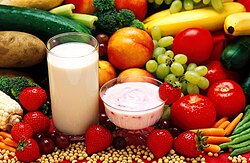| Vegetarianism | |
|---|---|
 | |
| Description | Diet derived from plants, with or without eggs and dairy |
| Varieties | Ovo, lacto, Lacto-ovo, veganism, raw veganism, fruitarianism, Buddhist vegetarianism, Jain vegetarianism, Jewish vegetarianism, Christian vegetarianism, Sattvic vegetarianism |
Vegetarianism is the practice of abstaining from the consumption of meat (red meat, poultry, seafood, insects, and the flesh of any other animal). It may also include abstaining from eating all by-products of animal slaughter.[1][2] A person who practices vegetarianism is known as a vegetarian.
Vegetarianism may be adopted for various reasons. Many people object to eating meat out of respect for sentient animal life. Such ethical motivations have been codified under various religious beliefs as well as animal rights advocacy. Other motivations for vegetarianism are health-related, political, environmental, cultural, aesthetic, economic, taste-related, or relate to other personal preferences.
There are many variations of the vegetarian diet: an ovo-vegetarian diet includes eggs and a lacto-vegetarian diet includes dairy products, while a lacto-ovo vegetarian diet includes both. As the strictest of vegetarian diets, a vegan diet excludes all animal products, and can be accompanied by abstention from the use of animal-derived products, such as leather shoes.
Vegetarian diets pose some difficulties. For vitamin B12, depending on the presence or absence of eggs and dairy products in the diet or other reliable B12 sources, vegetarians may incur a nutritional deficiency.[3] Packaged and processed foods may contain minor quantities of animal ingredients.[2][4] While some vegetarians scrutinize product labels for such ingredients, others do not object to consuming them, or are unaware of their presence.[2][5][6]
- ^ "What is a vegetarian?". Vegetarian Society. Archived from the original on March 18, 2018. Retrieved March 18, 2018.
- ^ "The vegetarian diet". nhs.uk. February 23, 2022. Archived from the original on August 15, 2022. Retrieved April 2, 2023.
- ^ "Fact Sheets: Things to look out for if you are a vegetarian/vegan". Vegetarian Society. September 2015. Archived from the original on March 18, 2018. Retrieved March 18, 2018.
- ^ Keevican, Michael (November 5, 2003). "What's in Your Cheese?". Vegetarian Resource Group. Archived from the original on March 18, 2018. Retrieved March 18, 2018.
- ^ "FAQ: Food Ingredients". Vegetarian Resource Group. Archived from the original on November 4, 2013. Retrieved March 18, 2018.